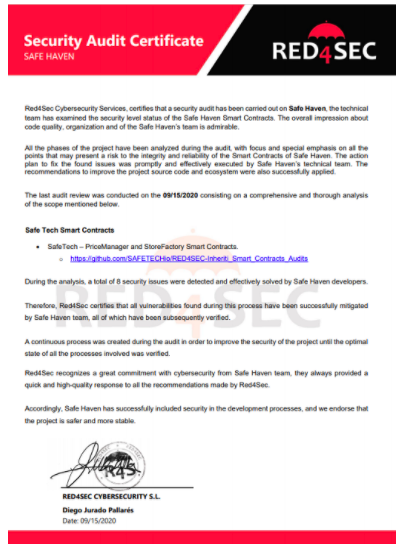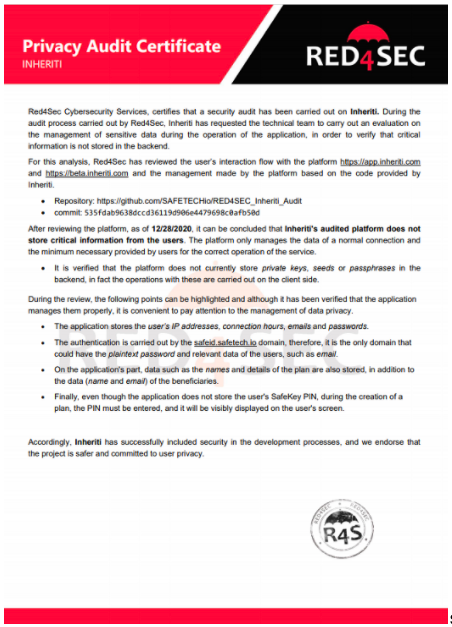It’s Time to Make Estate Planning Easier with Digital Inheritance Contracts, But It Requires More Than Our Traditional Smart Contracts.
Back in October 2019, an eight month long study was conducted by the Cremation Institute about the number of crypto holders who had some sort of estate plan in place. What the report revealed was that 23% of the surveyed 1,150 crypto holders reported having a documented plan for passing on their crypto assets in case of their death. And for the 89% of participants who simply said they were worried whether or not their assets would be passed onto their loved ones, no plan existed.
However, what isn’t obvious in the report, is that the 23% of the people that do have some kind of a backup plan, will take a copy of their keys and put them somewhere which leaves it open to being stolen, lost, and/or misplaced.
Today, with Millennials and Gen-Z becoming more immersed in the world of digital finance, the lack of planning is getting stronger. CoinDesk, which covered the study, said that these two demographics are 10 times more likely to lack a crypto inheritance plan than their elders.
What’s problematic is that there is a general lack of crypto estate law around the world, but more importantly, in law schools.
Andrew Rossow, an adjunct law professor at The University of Dayton School of Law, teaches Cyberspace Law, an upper-level law school course designed to teach students how today’s newest technologies serve as a cushion (and often a hindrance) to today’s outdated laws. “I can guarantee you that most Wills & Trust courses, as they are often referred to in law school, do not yet account for the world of digital money. This is problematic as we send students out into the real world to practice.”
At the end of each semester, Rossow says he teaches his students the very basics behind cryptocurrency and blockchain technology, referring to attorney Pamela Morgan’s book, “Cryptoasset Inheritance Planning.” This guide, according to Rossow is the perfect companion for introductory courses that teach on digital assets.
Taking Digital Inheritance to the Next Level…
Beyond the classroom, however, companies need to look for practical solutions for their clients, otherwise they’re going to be in trouble, the attorney went on to explain. “And that requires taking the existing technologies, like traditional smart contracts, and building upon them.”
Safe Haven is a decentralized platform that builds blockchain-based financial, asset management, and inheritance solutions. Safe Haven also is coupled with the company’s own digital inheritance solution, Inheriti, which according to Thomas Ambrosia, the company’s Head of Operations & Growth, provides the immutable aspect of blockchain smart-contracts with decentralized cold-storage of an individual’s most important digital assets. Basically, going back to the study mentioned at the beginning of this article, Inheriti would remove that risk of assets being stolen, lost, and/or misplaced.
Going beyond Inheriti and looking to the company’s B2B2C platform, built upon the VeChainThor Blockchain, Safe Haven by and through VeChainThor allows users the opportunity to secure their digital assets without locking themselves out, serving as a “safe haven” against crypto asset loss–a loss that is very real in today’s legal landscape when we talk about digital inheritance, Rossow also points out.
We need to be forward thinking when we are looking at digital assets and their recording on the Blockchain, according to Jürgen Schouppe, CEO and CTO at Safe Haven. “For this reason, we required a token that could be utilized as both a payment method and utility allowing signature of these digital contracts.”
In September 2020, Inheriti underwent a smart contract security audit, conducted by Red4Sec Cybersecurity Services. The purpose of the audit was to focus on and place special emphasis on all the points that may present a risk to the integrity and reliability of all the smart contracts on Safe Haven’s platform. The audit explored SafeTech’s PriceManager and StoreFactory Smart Contracts.
During the analysis, a total of 8 security issues were detected and effectively solved by Safe Haven developers. It was concluded that Safe Haven, as of September 15, 2020, and its smart contracts are “safer and more stable.”

Subsequent to the privacy audit, Safe Haven underwent a smart contract audit in December 2020, which focused on the data privacy measures specifically, also conducted by Red4Sec Cybersecurity Services. The audit confirmed that Inheriti’s platform does not store any critical data, nor will the information and/or content users choose to store within their Inheriti plan be subject to risk.

De-Stressing Estate Planning
“Estate planning is already a very convoluted and stressful process,” Rossow says, adding that “when we throw digital currency into the picture, it becomes even more difficult, as our laws are still catching up to this new type of technology.” Rossow regularly writes as an Opinion Contributor for CoinTelegraph, on the evolving nature of digital monies and how our laws are beginning to take shape around its existence. One of his earliest articles, published on Bitcoin Magazine back in July 2018, was shared by the U.S. House Committee on Agriculture and the U.S. Commodity Futures Trading Commission (CFTC) social media, as Congress was discussing how cryptocurrency was beginning to impact the U.S. marketplace.
“We’re seeing expansive growth within this space,” says Thomas Ambrosia, Head of Operations & Growth at Safe Haven. “Not only are we seeing it within the retail segment, we are seeing large institutional acquisition of digital assets. Digital estate planning is not necessarily a new concept, as there are existing centralized vault options available; however, in terms of what is necessary for the safe distribution of digital assets held by decentralized wallets – ‘cryptocurrencies’, non-fungible tokens, and other blockchain assets – a fully decentralized solution is most secure.”
The State of Wyoming, according to Rossow, has been at the forefront of this technology, welcoming blockchain technology and bitcoin usage with open arms. “Recently, Wyoming introduced a bill for the implementation of a system that would allow for company filings, all using blockchain technology.”
And this bill which Rossow refers to, HB0142 is a commercial filing system update where the State of Wyoming would implement this technological framework for use by companies to file state-required reports, data, and other information required by law. The filing system would also harness APIs while providing necessary security standards through authenticated digital identities, bringing in interested parties to such transactions such as businesses, attorneys, and registered agents. This system would be in place by the end of 2021.
This is a space in which Ambrosia describes as “previously in question”, now seeing growth as a result of mass adoption. “Digital assets appear to be the future store of value, and with the Blockchain being the underlying backbone structure, it only makes sense to begin affording solutions that combine estate planning and this technology.”
Dead Men Tell No Tales…
Just as the digitization of music came into existence and product placement in high-end film franchises like 007 have helped artists and brands become forever immortalized in the digital space, digital inheritance also looks to immortalize an individual’s digital property.
Looking to digital inheritance smart-contracts, Schouppe distinguished “Time-Locked Smart Contracts” and “Legal Entity-Time Smart Contracts”:
“As many fluent in the space understand, smart-contracts hold ownership and release ownership of assets once certain conditions are met. For what we wanted to build, however, this was not elaborate enough. We wanted to expand on the concept of smart-contracts further, as they limit the longevity of privacy, specific to the data held. Despite what one may believe, the data contained within time-locked smart contracts is not truly ‘decentralized’ in and of itself.”
So what does the CEO mean? “Blockchain isn’t meant for datastore and certainly not for decentralized data storage in the sense that data is not ‘split’ over different nodes,” he explains. “Inheriti does in fact split this data, making it truly decentralized. The solution splits critical data into shares and distributes them amongst different stakeholders, but more importantly, amongst different media devices including the cloud, cloud storage providers, and distributed ledger technology (DLT).”
Trust Alliance Network and Dead-Man Switches
The company also added optional layers of security to help protect the platform even further, including the Trust Alliance Network and decentralized validators, and dead-man switches, which allow for the release of critical data.
“Dead man’s switches” in the context of Inheriti are elements within the solution that warn a user that their plan is being “triggered.” For example, let’s say someone starts the merge process of encrypted shares of a particular company’s stock–the individual’s plan will send an email letting the individual know.
“If I’m dead, it’s no big deal,” Ambrosia explains. “If I’m alive, that plan shouldn’t be merging.”. For those who establish an inheritance plan with the company, these switches serve as a protection method for clients. “Death doesn’t trigger these switches,” Ambrosia elaborated. “Dead-man switches are triggered to ensure that the person who created the plan is, in fact- gone.”
Looking back to 2017, CoinTelegraph interviewed acclaimed attorney, Pamela Morgan, who at the time, expressed her belief that dead-man switches in a traditional estate planning process (including automated transfers) aren’t “necessarily the most practical solution.”
“Automated transfer requires all the heirs to be able to manage their private key,” Morgan explained. “You can’t generate their private keys and give that to them. It’s not a good security practice,” she says, referring to requiring heirs to manage their private keys.
However, isn’t this simply a training issue, rather than a security issue?
Safe Haven’s digital inheritance solution isn’t about private key generation. “We aren’t generating private keys here,” David Kerr, Strategic Advisor to Safe Haven says. “It’s passing private keys on, securely.
The platform doesn’t use time-locked smart contracts, according to Schouppe. “We use basic store contracts, that are basically encrypted shares,” he continued. “The release of those DLT-based shares is only possible when the merge authority starts the merge process, and the initiator is not responsive to our keep-alive DMS calls. From there, the merge authority will gather all shares, which upon that event, the passphrase needed will be shared, beginning the decryption process. This process can only be done as the private key needed to decrypt the missing shares is on the SafeKey device.”
Morgan is an acclaimed educator, entrepreneur, author, attorney, and public speaker who has been working exclusively with bitcoin and open blockchains since early 2014. She is a widely respected authority on multi-signature governance and legal innovation in digital currencies.
Safe Haven’s entire ecosystem leverages the SHA utility-token, but is specifically utilized when signing smart-contracts within Inheriti. The token, according to Ambrosia, is used in every solution Safe Haven has released. The token’s infrastructure is what makes it different from any token out there, created specifically as gas (fee) to create the smart-contract store of data within Inheriti itself.
“Part of working with the blockchain, of course, is the signing of smart contracts. For our organization, to create a solution that was forward thinking in terms of digital assets, we required a token that could be utilized as gas, to sign the digital contracts. The SHA token is the blockchain’s cost of establishing the digital inheritance plan.”
The more sophisticated an Inheriti plan is, Ambrosia explains, the more contracts that must be signed. “Thus, a greater need for gas, and in our solution, the greater the amount of SHA required.”
The Trust Economy
You’ve heard it before, but without trust, we have no future. Trust is today’s new capital and engine of progress. Early on in space, it wasn’t feasible to safely transfer digital assets to loved ones, which brings to light Schouppe’s passion for creating such an ecosystem, as a father and security professional. “My background being in security, I knew that I couldn’t trust just anyone with the information that housed my mining profits,” said Schouppe.
“I couldn’t trust one person, but I could trust several people in a decentralized manner. I wanted to make sure that if something happened to me, that my children would have access to whatever I was prepared to leave them. The demographic in the space at the time was mostly males of child-rearing age, and I began to think in terms of the demographic as a whole. My anxiety drove me to the point where I began penciling potential solutions, eventually coming up with the decentralized method.”
But decentralization just wasn’t going to cut it for Schouppe. The solution soon evolved into a multi-layered security approach which the company now promotes and sells to clients as “Inheriti.”
Managing and designing ecosystems for trust is crucial for our financial sector to thrive in today’s digital age. Regardless of what industry you are in, estate planning is something you cannot avoid, which is why it’s crucial to do your own research.
As for what Safe Haven has in store for the future protection of its clients, resting on its laurels isn’t an option. Kerr shared that the company intends to forge ahead in its ongoing development of its products and embarking on a program to dramatically increase usage of Inheriti, along with a whole host of other products which also use the SHA token.
“What is clear to us currently is that no other organization has solved the challenge of providing a fully decentralized (and totally secure) solution for digital asset inheritance”, states Kerr. “So far, we are the only one. More importantly, very few people so far appreciate the full range of capabilities that Safe Haven has in place. The future is coming, and we’re fairly confident that we’ll play a key role in it.”

